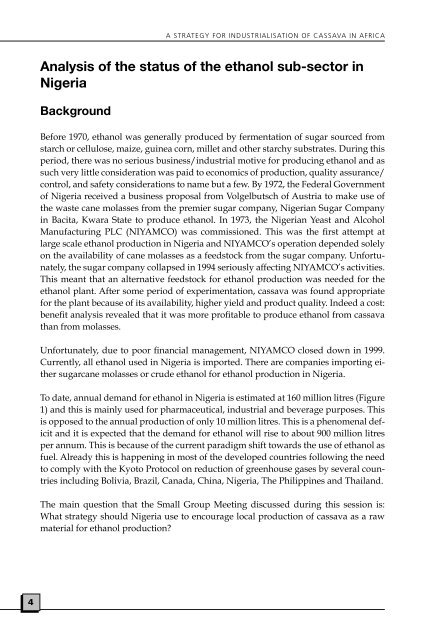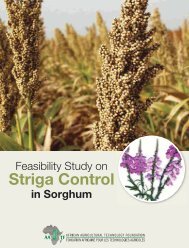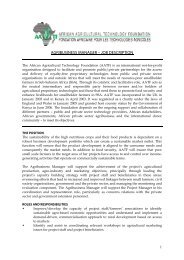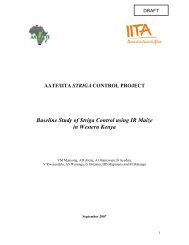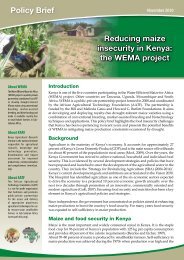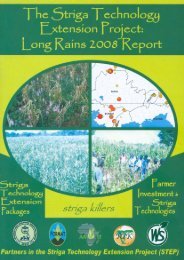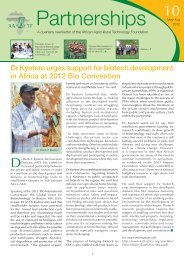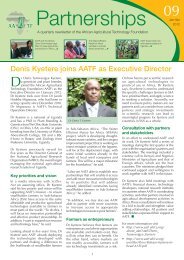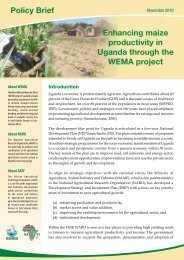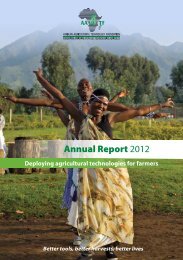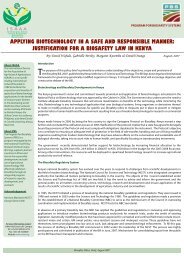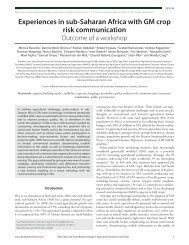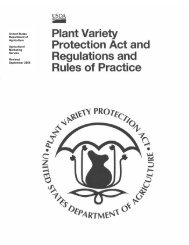A strategy for industrialisation of cassava in Africa - African ...
A strategy for industrialisation of cassava in Africa - African ...
A strategy for industrialisation of cassava in Africa - African ...
Create successful ePaper yourself
Turn your PDF publications into a flip-book with our unique Google optimized e-Paper software.
A STRATEGY FOR INDUSTRIALISATION OF CASSAVA IN AFRICA<br />
Analysis <strong>of</strong> the status <strong>of</strong> the ethanol sub-sector <strong>in</strong><br />
Nigeria<br />
Background<br />
Be<strong>for</strong>e 1970, ethanol was generally produced by fermentation <strong>of</strong> sugar sourced from<br />
starch or cellulose, maize, gu<strong>in</strong>ea corn, millet and other starchy substrates. Dur<strong>in</strong>g this<br />
period, there was no serious bus<strong>in</strong>ess/<strong>in</strong>dustrial motive <strong>for</strong> produc<strong>in</strong>g ethanol and as<br />
such very little consideration was paid to economics <strong>of</strong> production, quality assurance/<br />
control, and safety considerations to name but a few. By 1972, the Federal Government<br />
<strong>of</strong> Nigeria received a bus<strong>in</strong>ess proposal from Volgelbutsch <strong>of</strong> Austria to make use <strong>of</strong><br />
the waste cane molasses from the premier sugar company, Nigerian Sugar Company<br />
<strong>in</strong> Bacita, Kwara State to produce ethanol. In 1973, the Nigerian Yeast and Alcohol<br />
Manufactur<strong>in</strong>g PLC (NIYAMCO) was commissioned. This was the first attempt at<br />
large scale ethanol production <strong>in</strong> Nigeria and NIYAMCO’s operation depended solely<br />
on the availability <strong>of</strong> cane molasses as a feedstock from the sugar company. Un<strong>for</strong>tunately,<br />
the sugar company collapsed <strong>in</strong> 1994 seriously affect<strong>in</strong>g NIYAMCO’s activities.<br />
This meant that an alternative feedstock <strong>for</strong> ethanol production was needed <strong>for</strong> the<br />
ethanol plant. After some period <strong>of</strong> experimentation, <strong>cassava</strong> was found appropriate<br />
<strong>for</strong> the plant because <strong>of</strong> its availability, higher yield and product quality. Indeed a cost:<br />
benefit analysis revealed that it was more pr<strong>of</strong>itable to produce ethanol from <strong>cassava</strong><br />
than from molasses.<br />
Un<strong>for</strong>tunately, due to poor f<strong>in</strong>ancial management, NIYAMCO closed down <strong>in</strong> 1999.<br />
Currently, all ethanol used <strong>in</strong> Nigeria is imported. There are companies import<strong>in</strong>g either<br />
sugarcane molasses or crude ethanol <strong>for</strong> ethanol production <strong>in</strong> Nigeria.<br />
To date, annual demand <strong>for</strong> ethanol <strong>in</strong> Nigeria is estimated at 160 million litres (Figure<br />
1) and this is ma<strong>in</strong>ly used <strong>for</strong> pharmaceutical, <strong>in</strong>dustrial and beverage purposes. This<br />
is opposed to the annual production <strong>of</strong> only 10 million litres. This is a phenomenal deficit<br />
and it is expected that the demand <strong>for</strong> ethanol will rise to about 900 million litres<br />
per annum. This is because <strong>of</strong> the current paradigm shift towards the use <strong>of</strong> ethanol as<br />
fuel. Already this is happen<strong>in</strong>g <strong>in</strong> most <strong>of</strong> the developed countries follow<strong>in</strong>g the need<br />
to comply with the Kyoto Protocol on reduction <strong>of</strong> greenhouse gases by several countries<br />
<strong>in</strong>clud<strong>in</strong>g Bolivia, Brazil, Canada, Ch<strong>in</strong>a, Nigeria, The Philipp<strong>in</strong>es and Thailand.<br />
The ma<strong>in</strong> question that the Small Group Meet<strong>in</strong>g discussed dur<strong>in</strong>g this session is:<br />
What <strong>strategy</strong> should Nigeria use to encourage local production <strong>of</strong> <strong>cassava</strong> as a raw<br />
material <strong>for</strong> ethanol production?<br />
4


